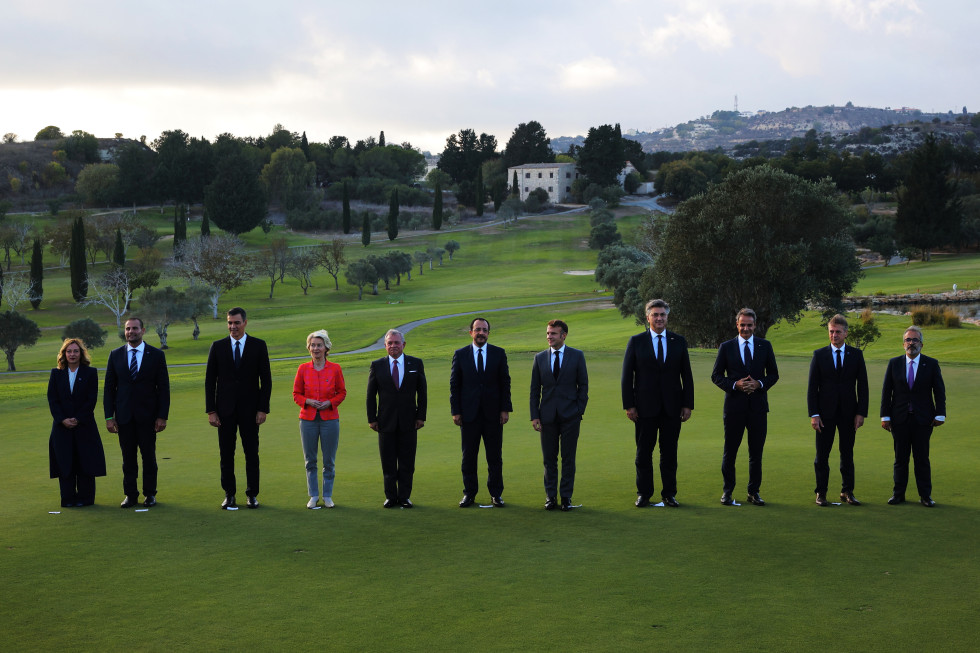MED9 leaders urge peace in the Middle East

Prime Minister Robert Golob today attended a summit of the Mediterranean EU countries, MED9, in Paphos, Cyprus | Author Daniel Novakovič/STA
The leaders discussed the situation in the Middle East, the EU’s relations with Jordan and the Mediterranean countries’ priorities in the new term of the European Commission.
After the meeting, Prime Minister Golob gave a statement to the media, first taking the opportunity to thank the President of Cyprus, Nikos Christodoulides, for the event’s excellent organisation, well-chosen topics and great speakers. The leaders discussed the most current issues, including the catastrophic conditions and slaughter in the Middle East, EU topics such as competitiveness, and the role of the Mediterranean. According to Prime Minister Golob, the unity displayed today on certain issues is something he would like to see repeated in Brussels next week. "It would give me great pleasure if the spirit of honest, informal dialogue spread to the European Council," he said. He stressed that the alarming situation in Palestine was the central topic of the bilateral meeting with the Jordanian King. "The slaughter has spilled into Lebanon and shows no sign of ending. We therefore jointly condemned the attacks of Israel’s army against the innocent civilian population and especially against UN workers and peace missions," said the Prime Minister. He added that "we called for an immediate ceasefire, the release of hostages and the pursuit of a humanitarian solution. Slovenia supports and welcomes both the peace plan presented by the Jordanian King and France’s initiative for de-escalation in the region."
On the margins of the summit, Prime Minister Golob met with the King of Jordan, Abdullah II. The bilateral meeting was a continuation of their regular dialogue, established at the Munich Security Conference and deepened at a humanitarian conference in Jordan, as well as in a telephone conversation during the UN General Assembly session. The two leaders exchanged views on the situation in the Middle East, focusing on Lebanon and the urgency of establishing a humanitarian corridor. They both agreed that a ceasefire was the first and the most urgent step towards the region’s stabilisation. The King of Jordan expressed his gratitude to Prime Minister Golob for Slovenia’s diplomatic efforts toward peaceful solutions, especially the country’s active role in the UN Security Council. The Prime Minister also met with President of the European Commission Ursula von der Leyen.
During a working lunch with the King of Jordan, the leaders spoke about the increasingly tense situation in the Middle East, focusing on Lebanon and the possible ways of strengthening humanitarian corridors to help people in crisis areas and to ensure the safety of the staff of peace missions and humanitarian organisations. In light of the upcoming European Council, Prime Minister Golob announced that Slovenia would propose an EU conclusion recognising Jordan’s importance to stability in the region and recognising that the Union should do everything it can to protect Jordan’s safety and borders. At the European Council meeting in October 2023, Prime Minister Golob presented Slovenia’s proposal for the EU to recognise the important role of Jordan and Egypt in efforts to ensure stability and peace in the Middle East. The conclusion was adopted by the European Council in June 2024.
The leaders concluded the meeting with a discussion about the priorities of the MED9 in the new term of the European Commission or the possibilities of taking a more active role in areas on which the member states have similar views to increase the group’s influence within the EU. Talks on competitiveness and migration focused on preparations for the European Council that will take place next week in Brussels. The leaders discussed a report on the competitiveness of the European economy, prepared by former ECB President Mario Draghi at the request of President Ursula von der Leyen. The report centres on boosting the EU’s competitiveness, which, according to MED9, should also be reflected in the next budget of the European Commission.

